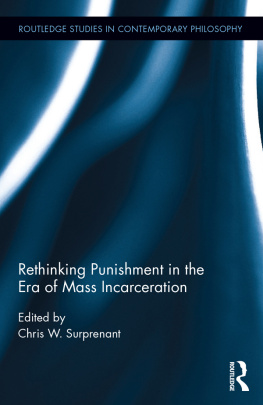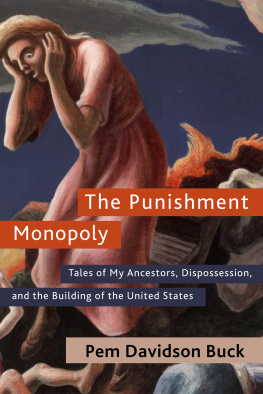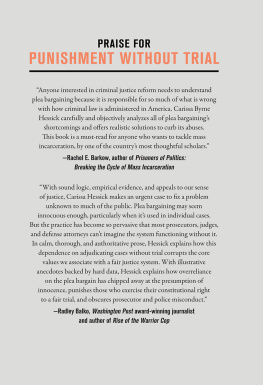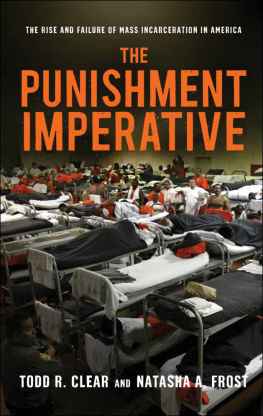Rethinking Punishment in the Era of Mass Incarceration
One of the most important problems faced by the United States is addressing its broken criminal justice system. This collection of essays offers a thorough examination of incarceration as a form of punishment. In addition to focusing on the philosophical aspects related to punishment, the volumes diverse group of contributors provides additional background in criminology, economics, law, and sociology to help contextualize the philosophical issues. The first group of essays addresses whether or not our current institutions connected with punishment and incarceration are justified in a liberal society. The next set of chapters explores the negative effects of incarceration as a form of punishment, including its impact on children and families. The volume then describes how we arrived at our current situation in the United States, focusing on questions related to how we view prisons and prisoners, policing for profit, and the motivations of prosecutors in trying to secure convictions. Finally, Rethinking Punishment in the Era of Mass Incarceration examines specific policy alternatives that might offer solutions to our current approach to punishment and incarceration.
Chris W. Surprenant is Associate Professor in Philosophy and Director of the Alexis de Tocqueville Project in Law, Liberty, and Morality at the University of New Orleans, USA. He is the author of Kant and the Cultivation of Virtue (Routledge 2014), co-editor of Kant and the Scottish Enlightenment (Routledge 2017) and Kant and Education: Interpretations and Commentary (Routledge 2011), and has written numerous articles on various aspects of Kants moral and political philosophy.
Routledge Studies in Contemporary Philosophy
For a full list of titles in this series, please visit www.routledge.com
84McTaggarts Paradox
R. D. Ingthorsson
85Perspectives on Ignorance from Moral and Social Philosophy
Edited by Rik Peels
86Self-Reflection for the Opaque Mind
An Essay in Neo-Sellarsian Philosophy
T. Parent
87Facts and Values
The Ethics and Metaphysics of Normativity
Edited by Giancarlo Marchetti and Sarin Marchetti
88Aesthetic Disinterestedness
Art, Experience, and the Self
Thomas Hilgers
89The Social Contexts of Intellectual Virtue
Knowledge as a Team Achievement
Adam Green
90Reflective Equilibrium and the Principles of Logical Analysis
Understanding the Laws of Logic
Jaroslav Peregrin and Vladimr Svoboda
91Philosophical and Scientific Perspectives on Downward Causation
Edited by Michele Paolini Paoletti and Francesco Orilia
92Using Words and Things
Language and Philosophy of Technology
Mark Coeckelbergh
93Rethinking Punishment in the Era of Mass Incarceration
Edited by Chris W. Surprenant
Rethinking Punishment in the Era of Mass Incarceration
Edited by
Chris W. Surprenant

First published 2018
by Routledge
711 Third Avenue, New York, NY 10017
and by Routledge
2 Park Square, Milton Park, Abingdon, Oxon OX14 4RN
Routledge is an imprint of the Taylor & Francis Group, an informa business
2018 Taylor & Francis
The right of the editor to be identified as the author of the editorial material, and of the authors for their individual chapters, has been asserted in accordance with sections 77 and 78 of the Copyright, Designs and Patents Act 1988.
All rights reserved. No part of this book may be reprinted or reproduced or utilised in any form or by any electronic, mechanical, or other means, now known or hereafter invented, including photocopying and recording, or in any information storage or retrieval system, without permission in writing from the publishers.
Trademark notice: Product or corporate names may be trademarks or registered trademarks, and are used only for identification and explanation without intent to infringe.
Library of Congress Cataloging-in-Publication Data
A catalog record for this book has been requested
ISBN: 978-1-138-04779-2 (hbk)
ISBN: 978-1-315-17060-2 (ebk)
Typeset in Sabon
by Apex CoVantage, LLC
Contents
CHRIS W. SURPRENANT
JOHN HASNAS
MICHAEL HUEMER
NATHAN GOODMAN
CHRIS BARKER
ROBERT C. HUGHES
BILL WRINGE
DAVID BOONIN
EDDY NAHMIAS AND EYAL AHARONI
KRISTEN BELL
JOHANNA C. LUTTRELL
CARA H. DRINAN
ABIGAIL R. HALL AND VERONICA J. MERCIER
ANDREW COHEN AND WILLIAM GLOD
JOHN F. PFAFF
JOSH DOHMEN
BRIANA MCGINNIS
JASON BRENNAN
DANIEL J. DAMICO
Guide
This publication volume would not have been possible without a generous grant from the Charles G. Koch Charitable Foundation. I am incredibly thankful for their support of this project and the scholars who have contributed to this volume, as well as their support for other scholars working on a wide range of projects in the area of criminal justice reform.
Chris W. Surprenant
In June 2016, the United States found itself in the middle of a national sentencing controversy. 20-year-old Brock Turner, a star swimmer at Stanford University, was found guilty of sexually assaulting an unconscious 22-year-old woman behind a fraternity house dumpster. Turner was sentenced to six months in prison, three years on probation, and life registration as a sex offender. Public consensus appeared to be that Turners punishment was far too lenient and that justice demands a more severe penalty for such violent and reprehensible acts, both to punish the perpetrator and to send a message generally that this type of behavior will not be tolerated. Around the same time, another sentencing controversy was playing out in New Orleans. There, 34-year-old Jacobia Grimes faced a sentence of 20 years to life for stealing $31 in candy from a convenience store. Having been convicted of petty theft four times previously, the district attorney chose to prosecute Grimes as a repeat offender, subjecting him to certain mandatory minimum sentencing. Twenty years to life for a Snickers bar, or two or three or four, Judge Franz Zibilich wondered aloud during Grimess arraignment. Isnt this a little over the top?
This volume examines what I believe to be the most important topic in applied moral and political philosophy in the US: criminal justice reform, and, specifically, how we should go about addressing our problem of mass incarceration. As I write this introduction in February 2017, the US is second in the world in per capita incarceration, behind only the small island nation of the Seychelles. 2.3 million people currently occupy American prisons and jails, 0.71% of our population or approximately 1 out of every 140 people. This problem extends beyond jails and prisons and to our criminal justice system more generally. 820,000 Americans are currently on parole, which is a conditional release from prison, and another 3.8 million people are on probation, which often serves as an alternative to prison or jail. In total, a staggering 7 million people1 out of every 46 Americansare under the control of the US criminal justice system.
While these numbers seem staggeringly high, it may be the case that this outcome is just and that these individuals are being punished appropriately. But it is difficult to think clearly about just and unjust punishment without considering the question of why we punish, specific examples of punishment, and if those punishments aim at their intended goals. When thinking about justice and punishment our first thoughts likely go to the criminal justice system that we are most familiar with and whether or not we think that certain laws, and the penalties associated with breaking those laws, are fair. We rightly associate justice and fairness, and determining what is fair in any particular situation seems to depend on the circumstances relevant to that case. Factors such as why a person acted contrary to an explicit or understood rule, if the actor intended to violate that rule or cause serious harm, and the likelihood of that person acting badly again in the future all seem as if they should influence what punishment, if any, is the fairest response to undesirable behavior.








